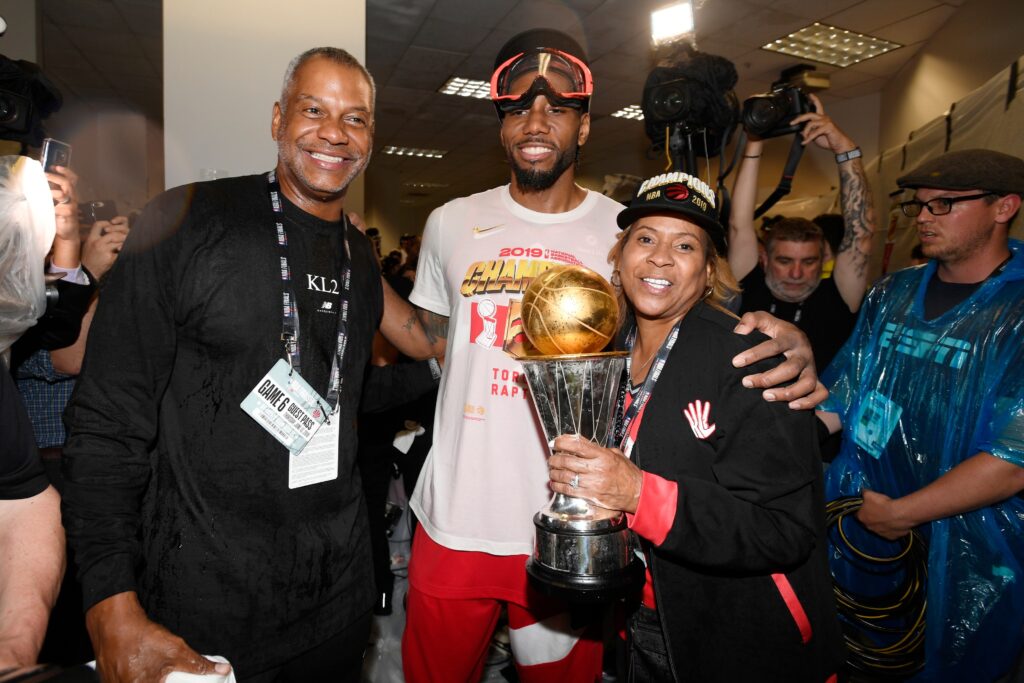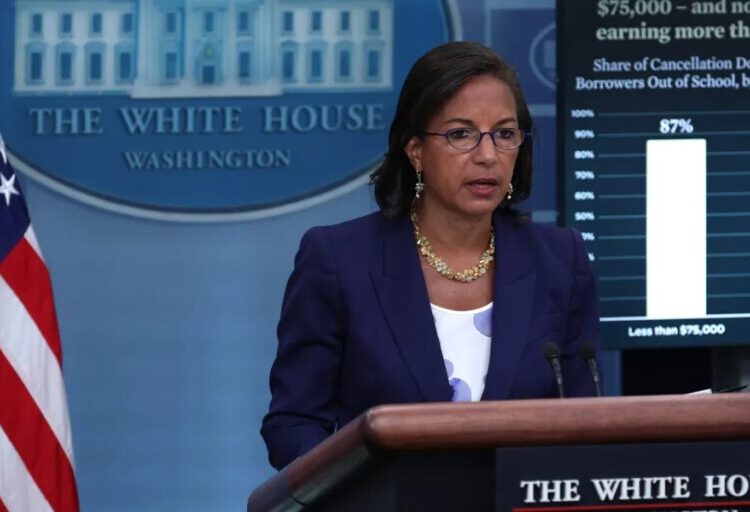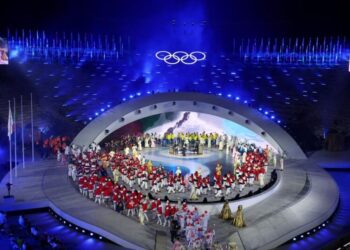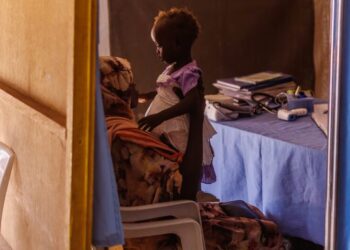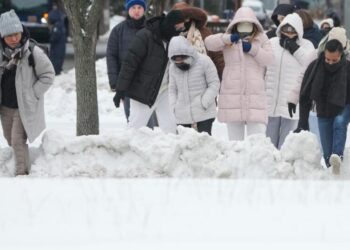LOS ANGELES — The meeting was set for a July afternoon in 2019, and the goal was clear: Close the deal with Kawhi Leonard, the reigning Finals MVP and top prize of the NBA summer.
With stakes that high, the Los Angeles Clippers enlisted big names: Doc Rivers, their coach who hosted the meeting at his house in Malibu; Jerry West, the Hall of Famer and team consultant; Lawrence Frank, the team’s president of basketball operations; and Steve Ballmer, the richest owner in basketball.
Leonard brought his agent; his mom, Kim; and his uncle, Dennis Robertson. Only Leonard and his agent were officially authorized to negotiate. But as the meeting went on, it was clear to West whom the Clippers needed to win over.
“Dennis seemed to be the commander of the roost,” West said later, in a previously unreported deposition for a lawsuit related to the team’s pursuit of Leonard.
Robertson, a retired banking executive and Leonard’s unofficial manager, didn’t want just a maximum salary for his nephew, Ballmer said in a deposition for the same case. He wanted sponsorship opportunities for Leonard and a house for himself.
NBA rules allowed Ballmer only to “make introductions,” he told Robertson, according to his deposition. What transpired next is unclear. But Leonard and Robertson chose Los Angeles, then set out on expanding their business and real estate portfolios, ushering the Clippers into a swirl of controversy and lawsuits in the process.
Even in a league notorious for back-channel negotiations and handshake deals, Robertson — known in NBA circles as “Uncle Dennis” — stands out for his bold pursuit of unconventional agreements that channel income into Leonard’s pockets and his own, according to records obtained by The Washington Post and interviews with people who know him. Those pursuits have left a trail of conflict in their wake, peaking with allegations, surfaced by journalist Pablo Torre, that Ballmer bypassed NBA salary-cap rules by funding a no-show marketing agreement for Leonard with a team sponsor, Aspiration, whose founder is facing federal fraud charges.
The NBA is investigating the allegations, which Ballmer and Leonard have denied. But the revelations, together with court records and interviews with more two dozen people around Leonard, shed light on the shadowy secondary economy that fuels player movement in the NBA — and the unique role Robertson plays in that market. It’s a saga of greed, fame and betrayal that has captivated sports fans and ensnared one of the best and most mysterious players of his generation.
It began soon after Leonard turned pro, when the sports agency that signed him put Robertson on its payroll and sent payments to a pair of “KL” LLCs, according to allegations Leonard’s former agent made in a lawsuit against the agency, which denied those allegations in court filings.
Later, Leonard’s college strength coach got a job with the Clippers on the condition that he pay Robertson 10 percent of his salary, the coach said in an ongoing wrongful termination lawsuit he filed against the Clippers, who have sought to move the dispute to private arbitration.
And when Leonard was seeking a new contract in 2019, records show, Robertson’s childhood friend tried to extract a payment from the Clippers if Leonard signed with the team, dragging Ballmer and West into depositions before a judge dismissed the case.
Through it all, Robertson has served as his nephew’s primary business partner and is listed as a manager for nine of the 25 LLCs registered to Leonard, according to records filed with state authorities.
The Clippers declined to comment on the record for this story and have said they will cooperate with the NBA’s investigation of the Aspiration deal. Robertson, who rarely issues public statements, didn’t respond to interview requests or detailed questions for this story. Neither did Leonard or his agent, Mitch Frankel.
At the Clippers’ media day this fall, Leonard said he and his representatives did nothing wrong. But his uncle’s business moves have brought at least one consequence: The spotlight Leonard has long sought to avoid now shines brighter than ever.
“He still has that banking mindset,” Carlos Dew, who managed players at the sports agency that signed Leonard, said of Robertson. “He’s about what he can get and how he can get it.”
A father figure
In the fall of 2007, an unusual visitor walked into the gym at Martin Luther King Jr. High in Riverside, California.
Coach Tim Sweeney Jr. didn’t typically allow parents into practice. But he made an exception for the uncle of a promising new transfer, especially given that he had come all the way from the East Coast.
Robertson, who worked in banking at the time, told Sweeney not to pigeonhole his 16-year-old nephew as a “big man.” Sweeney agreed — he saw the 6-foot-6, long-armed forward as a Division I wing — and over time, the coach built a rapport with Robertson, who Sweeney said flew out a few times a year for big games.
“He was definitely involved all throughout high school,” Sweeney recalled. “Dennis was one of the main people that wanted him to come over to Riverside King.”
A few months later, Leonard’s father was shot to death while closing up shop at the car wash he owned.
“With my dad passing away, there aren’t too many men in the family, and [Robertson is] a great guy to just talk to that has been through my experiences at my age,” Leonard told the San Antonio Express News in 2014. “He’s just been through life already.”
Robertson had been a high school basketball star himself at Susan Miller Dorsey High, a renowned Los Angeles public school that counts lawyer Robert Kardashian and author Charles Bukowski as former students. He gained a reputation as a smooth talker who was obsessed with basketball, persuading classmates to rebound for him at a local park.
“Dennis was always running his mouth,” said classmate Talaise Goodrum. “He’ll ask you any question, even uncomfortable questions. He didn’t care.”
He eventually played at the College of Idaho, majoring in business administration. Teammate Doug Brigham, a fellow business major, recalled Robertson transitioning seamlessly onto the rural campus.
“You want to be around him,” said Brigham, who is now the college’s president and noted that Robertson often returns as a guest speaker. “You could tell he was going to have a career and do well at whatever he was doing.”
With the Wall Street boom in full swing, Robertson moved east for a job in the finance industry, working his way up to become a vice president of retail banking at Chase. He commuted to Manhattan from a condominium in New Jersey while most of his family remained in Southern California, including Kim and her son, who had become a modest college prospect.
Justin Hutson, the San Diego State assistant coach who recruited Leonard, recalled he had a small circle — mom, uncle, high school coach, two AAU coaches. No one asked for money or challenged Kim, who was “running the show,” he said.
Robertson was in the loop but not overbearing, Hutson said. He wasn’t there when the coaches visited Leonard’s home or when Leonard visited campus. Two former San Diego State athletic directors and two former teammates said they didn’t remember meeting or hearing of Robertson, either, even as his nephew led the Aztecs to the Sweet 16 as a sophomore.
Hutson said he liked Robertson but spoke to him less than weekly and never about things such as playing time or the NBA. “It was just, ‘How’s my nephew doing?’”
But as Leonard developed into an NBA prospect, Robertson advised his sister behind the scenes on how to handle the agents who swarmed her son, according to two people with direct knowledge of the situation, who, like others in this story, spoke on the condition of anonymity to discuss private negotiations.
Leonard’s ascendance came at the perfect time for Impact Sports, a successful NFL agency whose founder, Mitch Frankel, was looking for a star to lead his new basketball division. Frankel, who was based in Florida, built out the Southern California operation in part by hiring Dew as a recruiter and partnering with agent Brian Elfus.
When Leonard decided to go pro after his sophomore season, he signed with Elfus and Impact in part because of under-the-table payments that are common across the basketball business, according to four people with knowledge of the situation and allegations Elfus later made in court.
Impact put Robertson and Leonard’s mother on the payroll for at least five years and made payments of $17,741 and $16,189 to two unnamed LLCs referred to as “KL3” and “KL4,” Elfus alleged in court. The agency denied those allegations in court and reached a settlement with Elfus, who declined an interview request for this story. Frankel didn’t respond to interview requests or detailed questions.
In 2011, Leonard was drafted 15th overall and signed a boilerplate rookie contract for four years and $8.3 million. Three years later, he helped the San Antonio Spurs win a championship and was named Finals MVP, setting himself up for a massive new deal that would secure generational wealth. That year, Robertson retired from banking.
According to his online biography, he took a position at Protocol International, the corporate etiquette training company founded by his wife, Cheryl Walker-Robertson. As president of Protocol’s Elite Athlete Division, Robertson provided “consulting, coaching and guidance to pro athletes, colleges & universities, high schools, and AAU teams,” the biography says.
But his main job appeared to be running Kawhi Leonard, Inc. He started making appearances at Impact’s offices, where everyone called him “Uncle Dennis.” The nickname struck some as odd because Robertson had a more professional background than some of the other “uncles” who hung around their players. But two former Impact employees posited that Robertson liked the persona because it belied his financial expertise.
Quickly, according to Dew and two others, Robertson began boxing out Elfus, preferring to work directly with Frankel. Elfus left in 2016 and sued Impact, claiming he didn’t get his cut of a large commission. The case ended with a settlement, records show, and Frankel has been Leonard’s sole official representative ever since. Robertson later told ESPN that Frankel paid him as a consultant.
“Mitch is going to do whatever it takes to hold onto Kawhi,” Dew said.
In 2015, Leonard won defensive player of the year and signed a “rookie maximum” contract extension for five years and $94.3 million. Two weeks before the start of the next season, he bought land to build a new house for his mom in San Antonio, and Robertson bought a condo in South Florida.
The Leonard business was booming. And Robertson had secured the position of chief adviser.
Trouble in Texas
For a while, San Antonio seemed like paradise. Leonard won another defensive player of the year award and was a perennial MVP candidate, finishing second in the voting in 2016 and third in 2017, all while maintaining a lower public profile than most athletes of his stature.
“He does not want to be a superstar,” his mom, Kim, once told ESPN. “He does not want to be in the limelight. He just wants to be good at what he loves to do.”
His inner circle hadn’t changed much since high school: a few close relatives, his longtime girlfriend and his childhood friend Jeremy Castleberry, who played with Leonard in high school and college and has been an assistant coach for Leonard’s pro teams every year since 2015.
Leonard wasn’t active on social media and rarely appeared in commercials, instead working with Robertson to find lower profile off-the-court opportunities. He hired a New York City lawyer to register a real estate holding company and listed Randy Shelton, his strength and conditioning coach at San Diego State, as the manager of a new company called “KL2 Performance,” which hosted basketball clinics in Southern California. One of Impact’s major investors told ESPN that he helped Robertson and Leonard find an investment property in Manhattan that earned them “seven figures” a year in rental income.
But trouble began in 2017. Early in the year, Robertson demanded that he and his nephew get equity stakes in the Impact agency, according to two people with knowledge of the request. The league’s CBA prohibits players from owning equity in a business that represents other players. (LeBron James and the NBA have denied rumors that James owns a stake in Klutch Sports Group, the agency founded by James’s longtime friend, Rich Paul.)
Meanwhile, Impact was recruiting a promising college prospect named OG Anunoby, whose favorite player was Leonard. When the agency asked Leonard to reach out to Anunoby, Robertson refused on Leonard’s behalf because Impact wouldn’t to give them equity, one person with knowledge of the situation said. Anunoby, whose representatives did not respond to a request for comment, eventually signed with a different agency. (Impact eventually dissolved, and Frankel left, bringing Leonard with him.)
Injuries led Leonard to miss all but nine games of the 2017-18 season. Spurs officials complained that Robertson and Leonard’s personal training team held him back even after team doctors cleared him. ESPN reported Leonard and “his camp” were “distant” and “disconnected” from the Spurs, and Robertson gave a rare interview to deny the story.
At the same time, Leonard’s negotiations for a new sneaker deal stalled with Jordan Brand, the division of Nike that had sponsored him since he entered the league. Behind the scenes, Robertson was encouraging his nephew to leave San Antonio and Nike behind, people close to them said.
Leonard demanded a trade, landed in Toronto, signed with New Balance and promptly won another title and Finals MVP trophy. In the champagne-soaked Raptors locker room, Leonard and Robertson took their most famous picture together: Leonard is grinning, ski goggles perched on his forehead, and Robertson is beaming, decked out in a “KL2” New Balance shirt.
That summer, Leonard was eligible for the NBA’s highest salary band, and suitors lined up to pay him. Toronto was an unlikely forever home, but Robertson asked the Raptors for an ownership stake in the Maple Leafs and $10 million a year in sponsorship income, the Toronto Star reported. (The Raptors declined to comment for this story.)
“Once again, it’s Dennis asking for the moon,” Dew remembered thinking any time he heard about Robertson’s proposals.
In reality, Robertson’s eyes had long been on Los Angeles, and an old friend there was eager to help.
His friendship with Johnny Wilkes stretched back to their days as high school basketball teammates. They had carpooled in Wilkes’s 1972 Cadillac, double-dated to prom and stayed in touch over the decades, according to Wilkes and mutual friends. Photos show Wilkes helping Leonard’s mother move out of her San Antonio home, Robertson attending Wilkes’s mother’s 70th birthday party and Wilkes joining Leonard’s family in Oakland to watch the Raptors play the Warriors in the 2019 Finals.
“Inseparable,” classmate DeCuba McMillon–Porter said. “Like brothers.”
Wilkes had connections of his own. His older brother played a few years in the league in the early 1980s. Wilkes sometimes texted Robertson asking whether he was interested in representing certain players he knew. Among those he encountered on the Southern California hoops circuit was Magic Johnson, the Lakers’ president of basketball operations and former star for the team.
Wilkes later testified that he first wanted to help get Leonard to the Lakers. In his deposition, he said that he talked to Johnson about the Lakers paying Wilkes a finder’s fee if Leonard signed with the team and that he planned to share the fee with Robertson.
Then, on April 9, Johnson announced his surprise resignation from the Lakers. In his deposition, Wilkes said Robertson asked him to arrange a meeting with Johnson to find out “why he resigned.” Wilkes shared two voicemails with The Post that he said he received from Johnson in the weeks after he stepped down. In one, Johnson confirms the meeting and asks Wilkes to send Robertson his cell number. In another, Johnson asks him to “tell Kawhi, ‘Let’s go and win these next seven … championships in the next 10 years, you know, with the Lakers.’”
Leonard has denied Wilkes played a role in his free agency decision, and the Lakers did not respond to requests for comment. Johnson, who also did not respond, told ESPN at the time that he was in touch with Leonard through an intermediary and only informally supporting the Lakers.
But by then, Wilkes’s attention had turned to the Clippers.
Ballmer’s star hunt
As Leonard entered free agency, Ballmer, the former Microsoft CEO and the Clippers’ billionaire owner, was facing a seemingly impossible task: challenging the Lakers as the best basketball show in town.
He had spared no expense since buying the team in 2014. He was building a new arena so the Clippers wouldn’t have to share a home court with their crosstown rivals. He had poached West from the Golden State Warriors. He had put together exciting playoff teams, but none had reached the conference finals.
Now, he needed a star. Which meant he needed Robertson.
Clippers officials had been trying to build connections with Leonard’s inner circle for years, records show.
Mark Hughes, the team’s assistant GM and a former assistant coach at San Diego State, had reached out to Leonard’s personal trainer, Shelton, as early as 2017, when the Clippers began “sensing some discontent between” Leonard and the Spurs, Shelton alleged in his lawsuit.
Over roughly 15 phone calls and at least seven meetings, according to Shelton, Hughes asked him for “information regarding Leonard’s needs” and “emphasized the Clippers’ desire to sign Leonard.” Shelton alleged that Hughes and Frank, the Clippers’ GM, told him he would have a job with the team if Leonard signed. The Clippers denied the allegations, calling the lawsuit a “shake down” attempt. The case is ongoing, as the Clippers argue that Shelton’s contract stipulated that any disputes go to arbitration.
In April 2019, the day after Johnson left the Lakers, the Clippers found another channel to Leonard and Robertson. Wilkes, Robertson’s old friend, spoke to Sam Watson, a Los Angeles boxing promoter who shared a mutual friend with Jerry West, according to text messages reviewed by The Post.
In his deposition, Wilkes said he couldn’t recall Robertson ever explicitly asking him to make inroads with the Clippers, but he said he believed they had a general understanding that he would facilitate back channels.
The chain of communication, revealed in court records and messages reviewed by The Post, is representative of how informal negotiations take shape before NBA free agency officially opens: Watson reached out to his boxing world colleague, Showtime broadcaster Jim Gray, who was close friends with West. West met Wilkes that evening, at halftime of the last Clippers home game of the 2019 regular season. West had the impression that Wilkes and Robertson “were purportedly the best of friends,” he said in his deposition. (Gray declined an interview request for this story. West died last year.)
In June 2019, messages and court records show, West and Wilkes discussed Leonard’s future over phone calls and texts. West said in his deposition that their conversations were “usually about Dennis.”
On a call a few days before the Clippers’ July meeting with Leonard, Wilkes told West that his services nudging Leonard to the Clippers would cost $2.5 million, Wilkes said in his deposition, adding that West replied that they “could sit down and talk about it.” West, in his deposition, denied saying that. The allegations later sparked an NBA investigation, which concluded that the Clippers didn’t violate league tampering rules. In his deposition, Wilkes said he informed Robertson of his proposal and offered him a cut.
When Leonard and his family arrived in LA for the pitch meetings, Wilkes drove them around, he said in an interview, an account corroborated by text messages. Wilkes said he joined the family for Leonard’s birthday party at Drake’s Hidden Hills estate, snapping photos of Robertson smiling in the pool, and shuttled them to the Four Seasons Hotel, where Leonard met with the Lakers.
The morning of the Clippers pitch meeting, West contacted Wilkes, leaving a voicemail inviting him to dinner as a show of gratitude, according to court documents.
“Just wanted to thank you for your help,” West texted Wilkes hours before the meeting, according to messages viewed by The Post.
“Please tell everyone to pitch life after basketball to Kawhi,” Wilkes replied. “That’s what he really wants to hear.”
“If he would go to the Lakers, he would be LeBron’s caddy,” West wrote.
“F— the Lakers,” Wilkes responded. “This is between you and Toronto.”
In the days after the July 1 meeting, West checked in with Wilkes.
“When can we expect a decision,” West asked July 4. “Don’t want to be a pest and frankly don’t want to bother Dennis anymore, if you hear anything please let me know. Thank you for all your help.”
“Will call you later,” Wilkes replied, “Will talk to Dennis again.”
West relayed the update to Ballmer.
“One of my guys is talking with Dennis,” he texted the Clippers’ owner. “He is going to let me know if he can find out anything, will let you know when I hear from him.”
That night, Wilkes texted Robertson that he had talked to West, on a three-way call with Watson, about a proposal for “Ballmer to fund the Kawhi marketing campaign.” Robertson didn’t respond, and Wilkes told The Post the proposal never came to fruition. In an interview, Watson denied the call took place. When shown his own texts with Wilkes about the call, Watson said he didn’t recall the exchange. The Clippers declined to comment.
The next day, Ballmer texted West, “Where did your guy think he is leaning.”
“Could not get indication,” West wrote back.
Two days later, West and Ballmer got their answer: Leonard signed a three-year, $103.14 million contract with the Clippers.
Shelton, the trainer, went with him. The Clippers hired him for a salary that peaked at $235,000, according to court documents that include his contract and termination letter, and he stayed with the team until it fired him in 2023 amid a dispute over Leonard’s injury recovery timeline. But Shelton didn’t negotiate his contract with Frank, he later claimed in his lawsuit, because “Frank dealt directly” with Robertson. And Robertson, the lawsuit alleges, told Shelton that he “would not permit” the Clippers to hire him unless he gave Robertson 10 percent of his total compensation. The Clippers denied those allegations.
Wilkes went on to sue the Clippers, too, claiming they owed him money for his “assistance in getting Kawhi Leonard to sign” with the team. West, Ballmer, Frank, and Leonard sat for depositions, which were sealed from public view but obtained in part by The Post. A judge dismissed the case, ruling that Wilkes never formed a contract with the Clippers.
After Leonard signed with the Clippers, he and Robertson made a flurry of new business moves through their LLCs: a $6.6 million house near San Diego, a $6.7 million penthouse suite in Los Angeles, a $17.1 million house overlooking the ocean near Malibu. Of the 32 companies Leonard or Robertson have started during his 14-year career, 28 were registered since 2019, a sprawling portfolio that includes energy drinks, music production, content creation, management consulting, sports camps and real estate investment.
One of them is now at the center of a scandal: KL2 Aspire, founded in 2021, the year Leonard negotiated a new contract with the Clippers. The LLC, which lists Leonard as its manager, received payments from a $28 million marketing deal with a company Ballmer invested in, according to a contract obtained by Torre. Former employees of the company, Aspiration, told Torre the deal was designed to help the Clippers circumvent NBA salary cap rules and that Robertson contacted the company’s CEO about a contract for Leonard to receive equity.
Ballmer, in an interview with ESPN, said he introduced Leonard to Aspiration leaders but had no knowledge of the endorsement contract and no role in arranging it. In a statement posted on social media, Aspiration’s former CEO, who pleaded guilty to wire fraud after the company went bankrupt this year, said that “before signing the sponsorship, I don’t remember having conversations about the NBA salary cap.”
In the years since, Leonard signed a contract extension with the Clippers and purchased his largest property yet. One of his real estate companies bought up seven parcels of land spanning more than 300 acres deep in the mountains northeast of San Diego. Assessed at around $16.9 million, the grounds include a house neighboring a cattle ranch, vacant fields zoned for agriculture, and a small private airport with an unpaved landing strip.
Gnarled branches and sagebrush line the bumpy dirt road that leads to the mountain properties, curving along cliffside switchbacks overlooking a rocky canyon. Phone service fades away miles before reaching the front gate. Behind the barbed wire fence, a boulder bears a message in white paint: NO TRESSPASSING.
It’s the sort of place that might appeal to someone who wants to get away from everything and never be found.
Albert Samaha reported from Los Angeles and San Diego County. Fortier reported from D.C.
The post The rise of ‘Uncle Dennis,’ the adviser at the center of an NBA scandal
appeared first on Washington Post.
